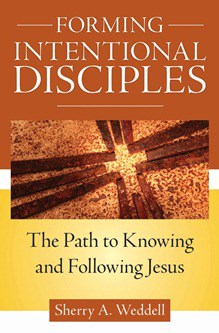This Q-and-A continues a Denver Catholic Register summer reading series on Catholic-themed books with a Colorado connection.
Colorado Springs author Sherry Weddell’s bestselling book “Forming Intentional Disciples: The Path to Knowing and Following Jesus,” was recently given to all priests of the Denver Archdiocese by Archbishop Samuel Aquila. Weddell, a co-founder of the Catherine of Siena Institute to develop lay apostles, also made a presentation on the work to the clerics. She spoke to the Denver Catholic Register earlier this month. Her comments have been edited for space and clarity.
Q: Who is the book “Forming Intentional Disciples” for?
A: It was written for Catholic leaders at all levels: so everyone from the bishop to a parish catechist and everyone in between. We wrote it for the nearly 3 million U.S. Catholics (of 78 million) who are deeply involved in their parishes outside of just attending Mass. I wrote it for that core of the core who determine everything that happens at the parish and diocesan level.
Q: What is the purpose of the book?
A: To share what we learned in eight years (of evangelization seminars) with 1,600 diocesan and parish leaders. They didn’t know there was a kerygma or a great story of Jesus to be told. They’d never told it and never heard it. We learned what people didn’t know and learned how to communicate the material so people could absorb it.
Q: What is the kerygma?
A: The kerygma (preaching) is the great story, the basic Gospel story of God becoming a human being in Jesus Christ. His teachings, miracles, suffering, death, resurrection and ascension. That whole drama. It is a Greek term from the early Church. It is distinguished from catechesis. All of our catechesis, our theology, our spiritual tradition flows out of that most basic revelation of God in Jesus Christ. Most Catholics never hear it as a story and never have time to process it and figure out what it means.
Q: Why have so many Catholics not heard it?
A: Because we don’t tell it as a story. We break it up into thousands of pieces and scatter it throughout catechesis. We have all the riches of Church tradition and the Church has meditated on it and written all this beautiful theological stuff about it, but the ordinary person in the pews doesn’t have that foundational story. We presumed people understood it and had said yes. But the evidence is that at a lived level that wasn’t happening for most people.
Q: Why are only 30 percent of Americans who were raised Catholic still practicing the faith?
A: I think it’s directly related to the fact that a huge number of them don’t even realize you can have a personal relationship with God. And the younger you are, the more likely that’s true. People don’t do things out of guilt or duty. They do things because it’s personally meaningful.
Q: Among the sobering statistics in your book: 10 percent of all adults in America are ex-Catholics, and the number of marriages in the Church decreased by nearly 60 percent between 1972 and 2010. Why do so many Catholics disregard Church teaching?
A: There has been a tremendous change in the culture from modernity to post-modernity. Post-modernity culture doesn’t believe in universal norms. People are comfortable with ambiguity and they trust their own experience. So much of what the Church was teaching presumed Christendom, a larger culture that supported and reinforced those values. Now the culture has dramatically changed and actually counters Church teaching. We are back to basic evangelism. If we just try to lay down moral rules, people don’t connect with that. But if we first lead them to Christ and help them to encounter him within the context of the Church then—through the graces they have received and the Holy Spirit—they will start to change from within. Then you can propose what the Church teaches in relationship to what it means to follow Jesus.
Q: How does one effectively evangelize?
A: The four basic steps are:
- Break the silence about the possibility of a personal relationship with God.
- Offer multiple opportunities for people to encounter Christ in the midst of his Church.
- Expect conversion and plan for conversion.
- Lay a foundation of intercessory prayer.
Q: What is an intentional disciple?
A: Someone who is deliberately attempting to follow Jesus in the midst of his Church. It’s not the same as being a saint. You could still be a terrible mess but you have begun the journey. We use the image of Peter and Andrew on the Sea of Galilee. They dropped their nets and followed Christ. Was Peter a saint when he left his net? No, he was a mess. But was he a disciple? Yes, he was. Discipleship isn’t sanctity, it’s like kindergarten—you’ve begun the journey.
BOOK
Title: “Forming Intentional Disciples: The Path to Knowing and Following Jesus”
Author: Sherry A. Weddell
Publisher: Our Sunday Visitor (2012)
Cost: $15.95




